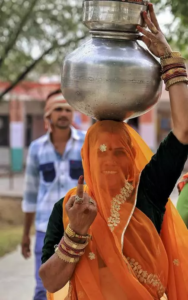On August 15, 2022, the 76th Independence Day of the Republic of India, the president of India’s speech reminded Indians of the nation’s progress, including its advances in digitisation. The president reminded us of the freedom struggle that our freedom fighters fought and stressed the importance of “Nation First” and the spirit of One Nation with “Ek Bharat, Shreshtha Bharat”. A year later, with the passage of multiple laws on digitisation and the end of the digitisation process of Digital India, I must declare the death of independence of cyberspace as we know it for Indians.
With continuous internet shutdowns, websites and application bans, mandatory Aadhaar, IT rules that censor anything online, facial recognition that powers active surveillance, VPN rules that want logs of all VPN servers, data raids on the media for phone cloning and a data protection law that forces duties, Digital India has run out of freedoms. Digital India, while wanting to become self-reliant and independent in the digitisation space, has entirely taken away citizens’ freedoms.
The idea of an independence for cyberspace comes from the early manifesto ‘A Declaration of the Independence of Cyberspace’ by John Perry Barlow, a libertarian and co-founder of the Electronic Freedom Foundation. Barlow wrote this in 1996, in the middle of a dinner party at the World Economic Forum – the high table of Global Capital. Barlow’s simple message through the manifesto was “Governments can’t govern cyberspace”. He declared cyberspace’s independence and claimed governments of the world have no sovereignty over cyberspace.
“Governments of the Industrial World, you weary giants of flesh and steel, I come from Cyberspace, the new home of Mind. On behalf of the future, I ask you of the past to leave us alone. You are not welcome among us. You have no sovereignty where we gather.”
Barlow’s arguments were often misunderstood, if understood at all, with multiple commenters saying how Barlow was wrong. Twenty years after the manifesto’s release, he clarified the dependence of cyberspace on physical infrastructure and how the government could intrude on cyberspace. But he clarified how the actors of cyberspace like himself didn’t like to be governed and this marks up as an immune system that helps defend cyberspace.
The early internet was built on the ideas of anonymity and personal sovereignty, and with an aim of building a civilisation of mind. The early actors who were building the internet protocols actively strived to keep it away from corporations and nation states. The crypto wars between Cypherpunks and the United States government ensured encryption was available to the general public as the internet expanded.
Digital India does not have the same foundations of that of the early internet, with the Digital Identity Project – Aadhaar becoming its foundation. India’s digitisation process was based on ideas of identity, national sovereignty pushing surveillance, data as property and building India as an economic model. The nation state in this case – the Government of India – forced its ideas of property, expression, identity and movement, ideas that Barlow said do not apply for cyberspace.
“Your legal concepts of property, expression, identity, movement, and context do not apply to us. They are all based on matter, and there is no matter here.” – John Perry Barlow
The Indian internet movements, which actively fought for freedoms, had their moments with the net neutrality, Section 66A, right to privacy and internet shutdown judgements. But it has been a challenge to get these freedoms exercised in India. Privacy has been overturned against people by forcing them to share data everywhere. Even though Section 66A of the IT Act has been scrapped by the Supreme Court, the government continues to arrest activists and journalists like Disha Ravi and Mohammed Zubair under flimsy grounds. Manipur shows us yet again, internet shutdowns remain a problem with no solution – other than pointing out the active censorship.
Any democratic right that is being evolved for safeguarding citizens in Digital India has been completely overruled with laws and policies that have completely opposite effects. The early ideas of freedoms that were promoted through the internet and democratic participation that were thought to be a cornerstone have been reduced to mere words. The economic and political factors that allow this to foster in today’s India might be hard to change, when it is being sold to the population as a success story.
With the Personal Digital Personal Data Protection Act, the Government of India claims it has provided Indians with the ability to exercise their fundamental right to privacy. The reality is that it is full of exceptions that suppress our freedoms. In our post-truth world, there are now claims by the right wing crediting minister of state for electronics and information technology Rajeev Chandrashekar as the main player behind the Supreme Court’s right to privacy judgment and now the hero of the data protection law.
The push for ideas of borders and boundaries to cyberspace is now expanding to infrastructures with restrictions on electronic items like laptops. A self-resilient India with manufacturing carried out in India will have its own restrictions placed on electronics. A future with restrictions on encryption hardware is quite possible, denying Indians the ability to encrypt storage. We already witness this with the policies and arguments the Government of India makes in relation to WhatsApp’s encryption ability in our courts.
India’s push to take control of cyberspace and all forms of communications is a witch hunt that began after the 26/11 Mumbai attacks. The security state interests of documenting everyone inside our borders is clearly visible with the push to collect biometrics in Manipur. The push for biometrics-based infrastructure to regulate population travel is again visible with Digiyatra. These interests are not limited to areas with violence but to peaceful neighbourhoods where the police have pushed active surveillance.
The idea of national sovereignty taking over above all else including personal freedoms has turned freedoms into mere slogans. This is not specific to cyberspace, but to all forms of fundamental rights that are being ignored by the nation state in its push for economic and political control. The idea of independence and freedoms don’t hold the same value with them being replaced with ideas of self-reliance and economic prosperity of the nation. I doubt if Indians can aspire for freedoms in cyberspace, given the pace at which the nation state takes over every aspect of our lives with digitisation.
(Srinivas Kodali is a researcher on digitisation and a hacktivist. Courtesy: The Wire.)




